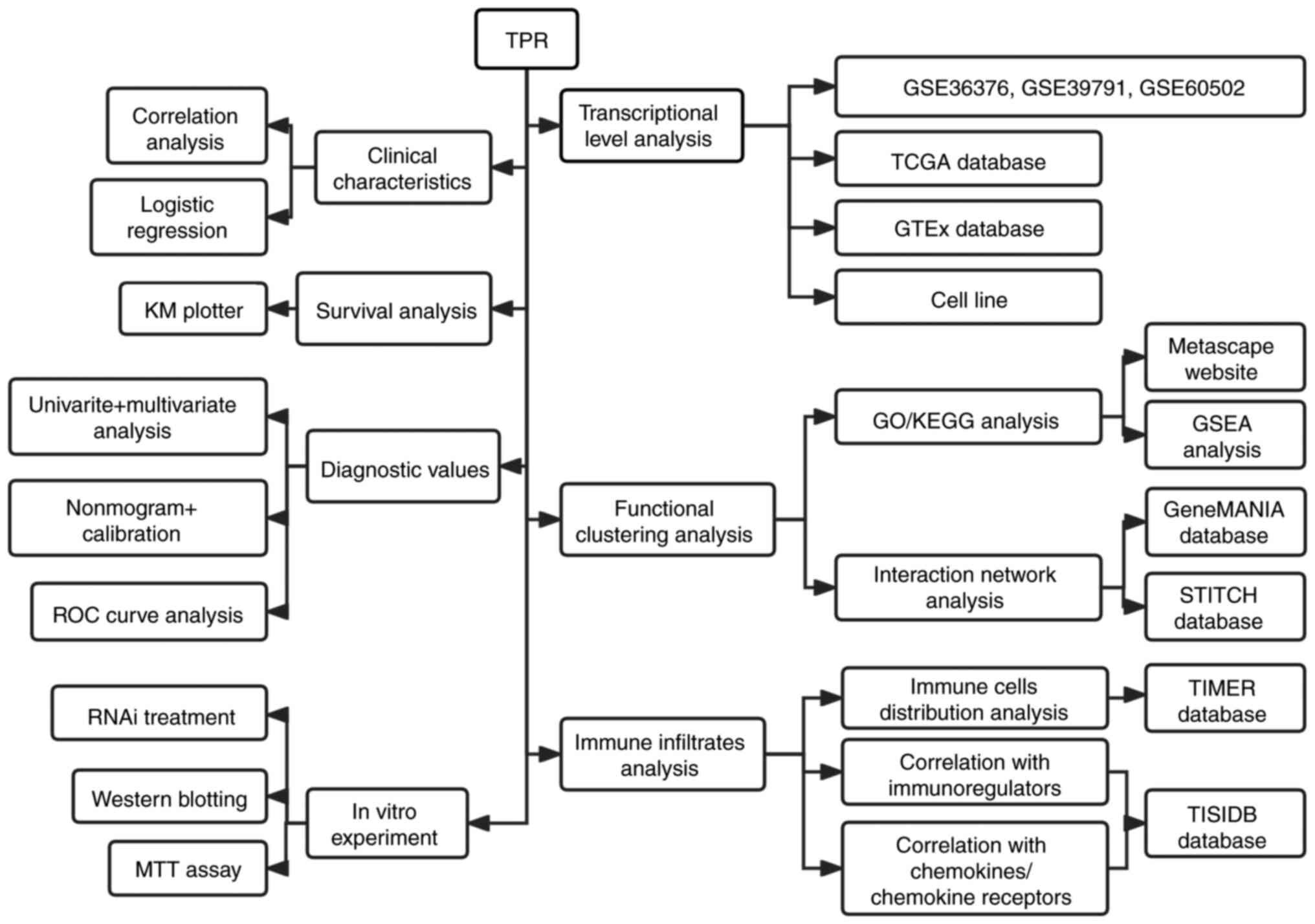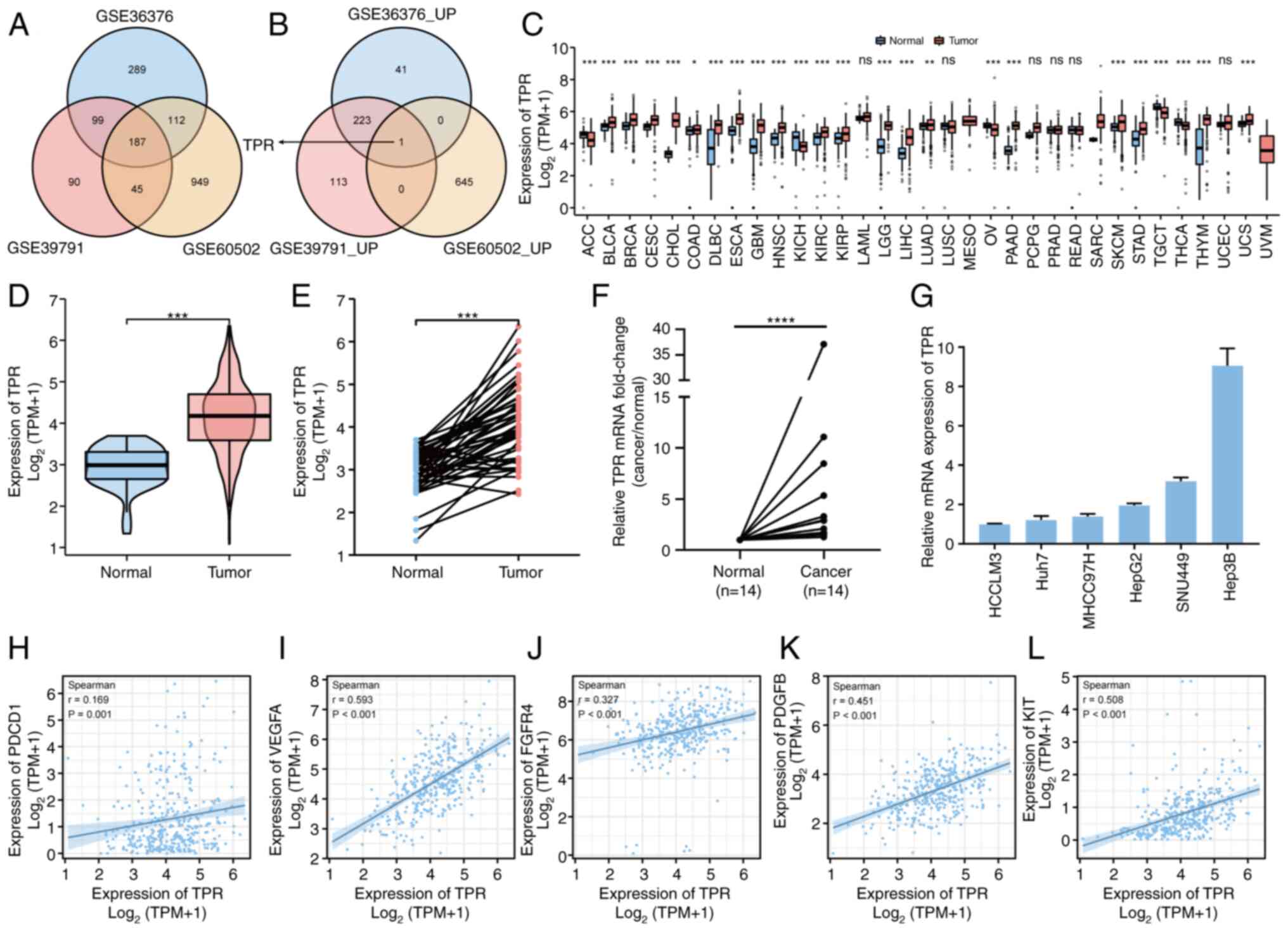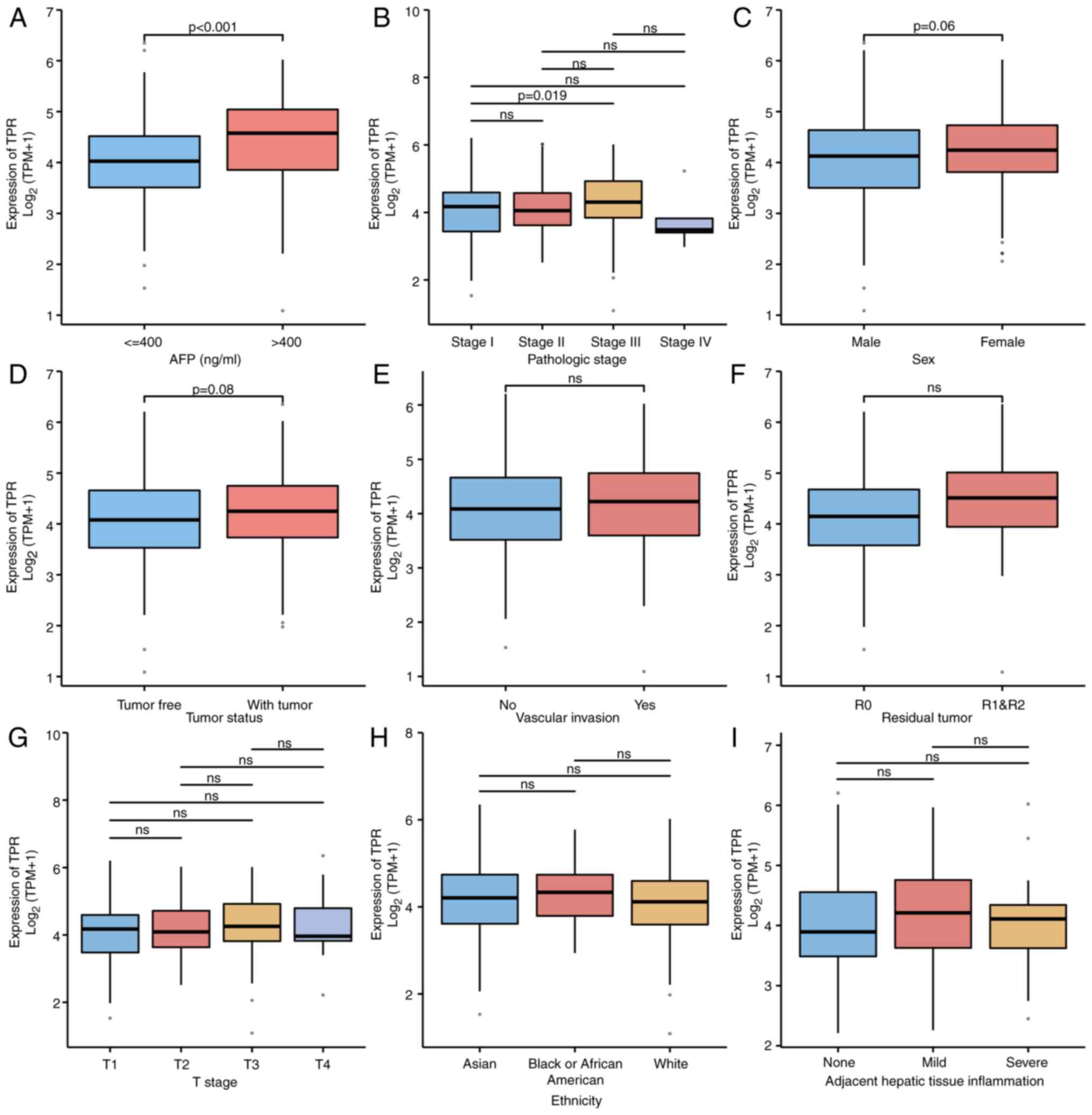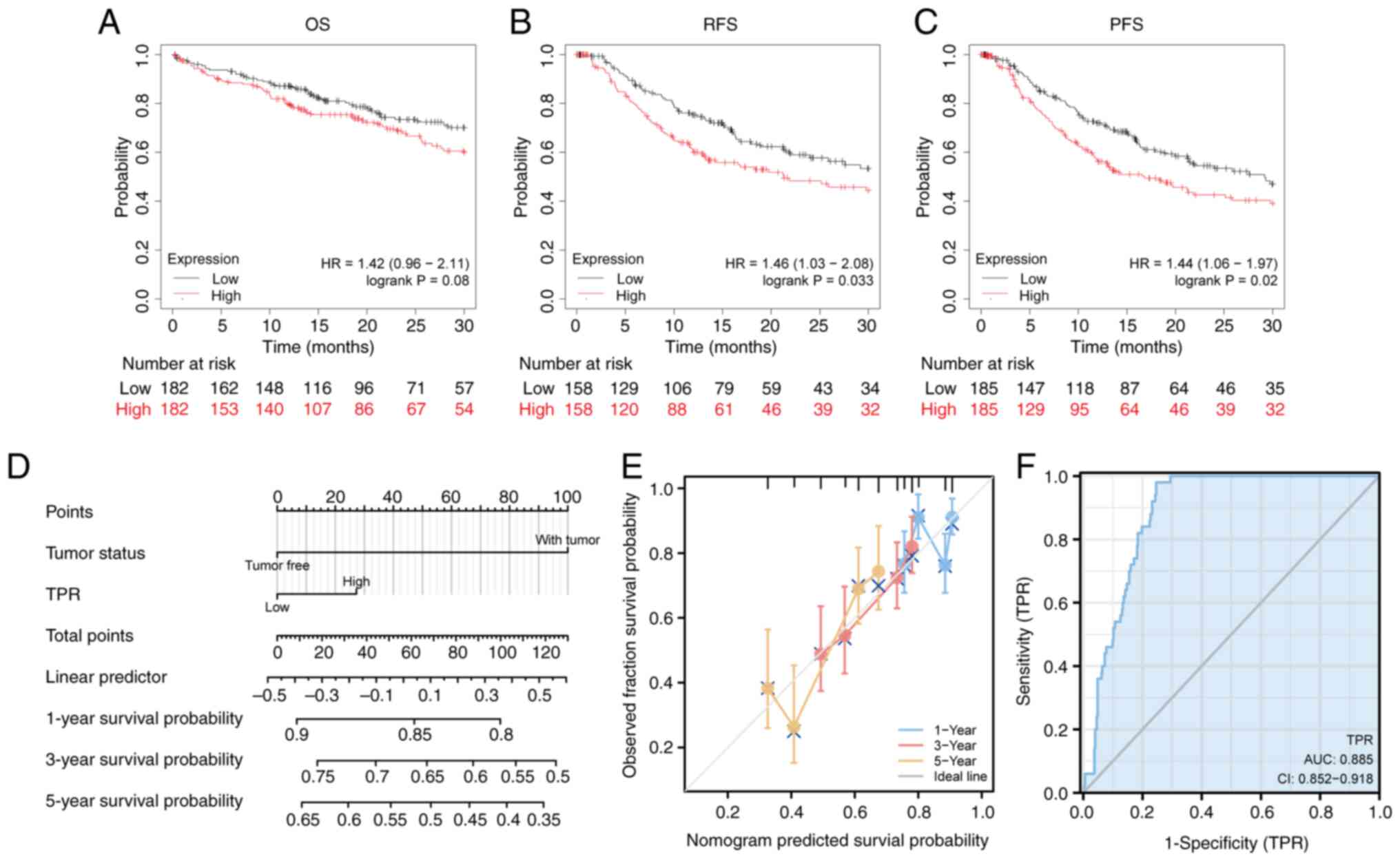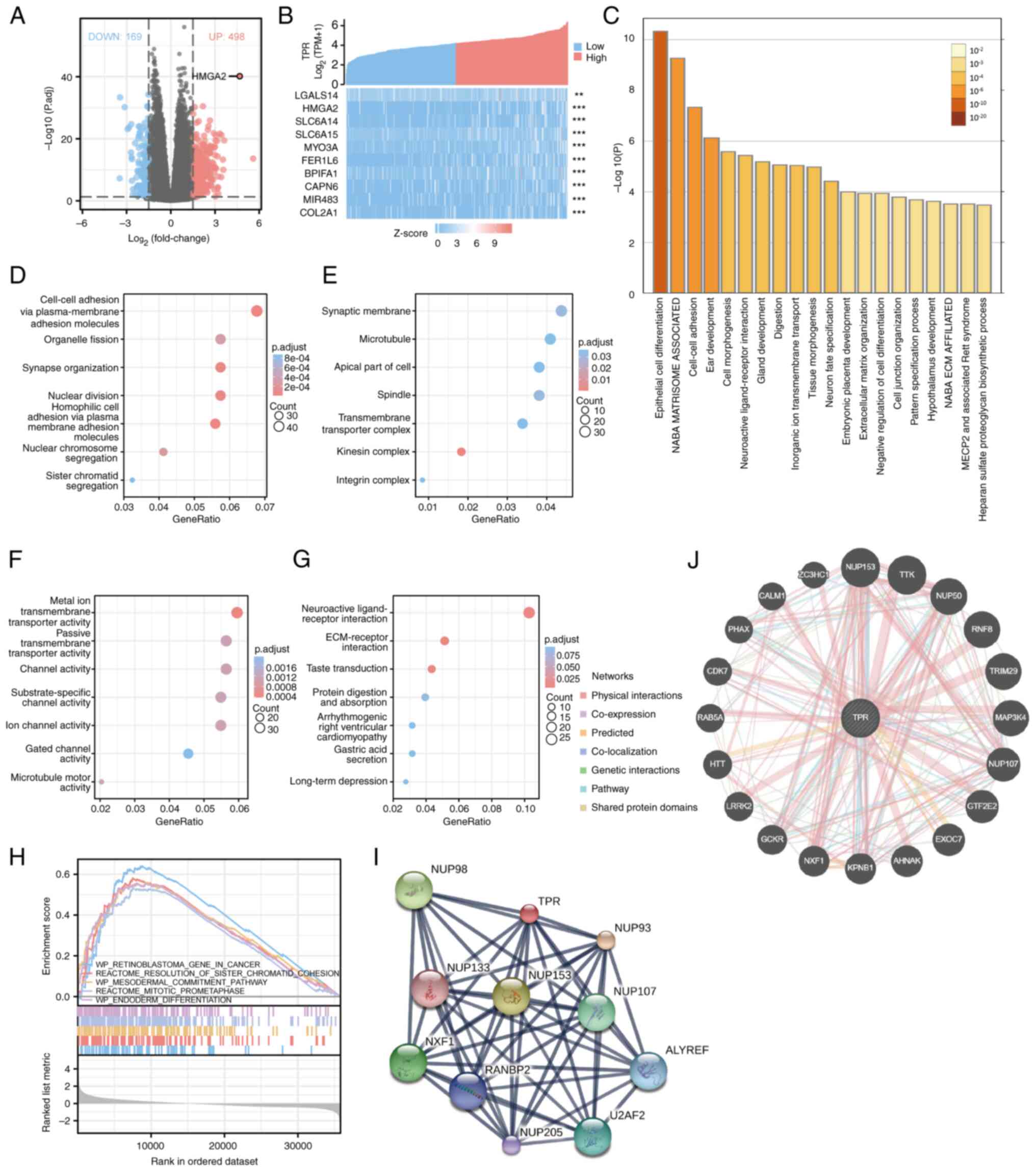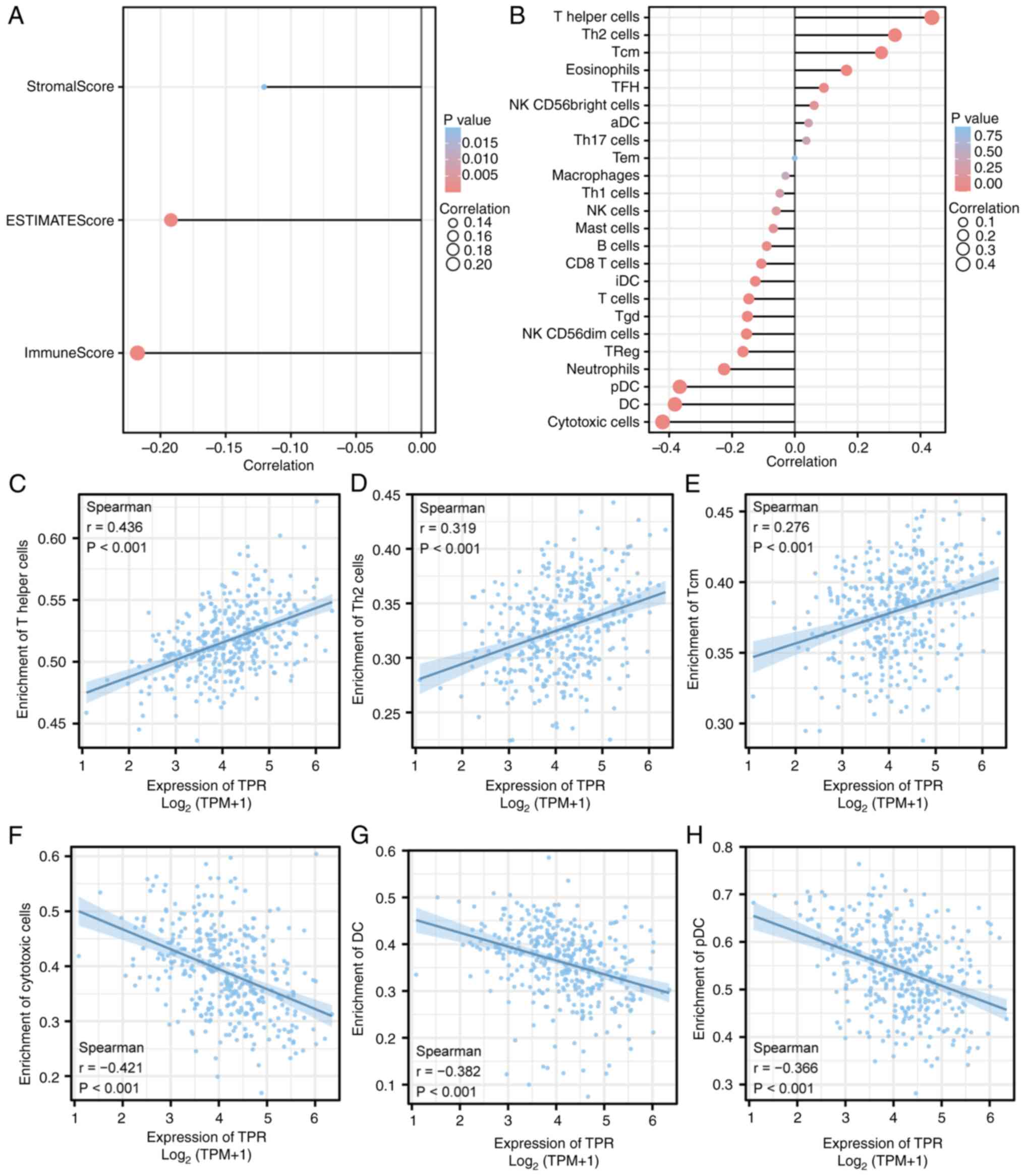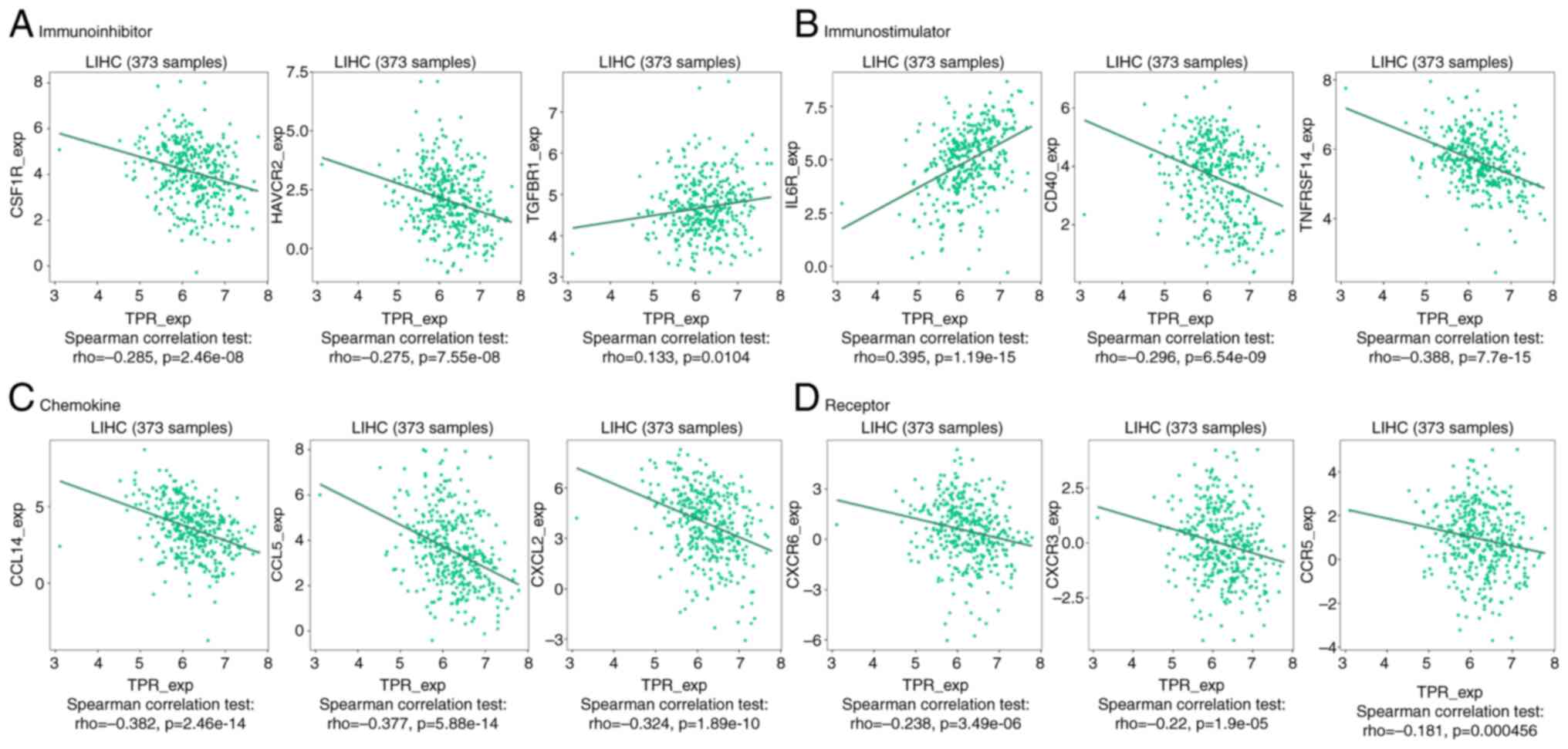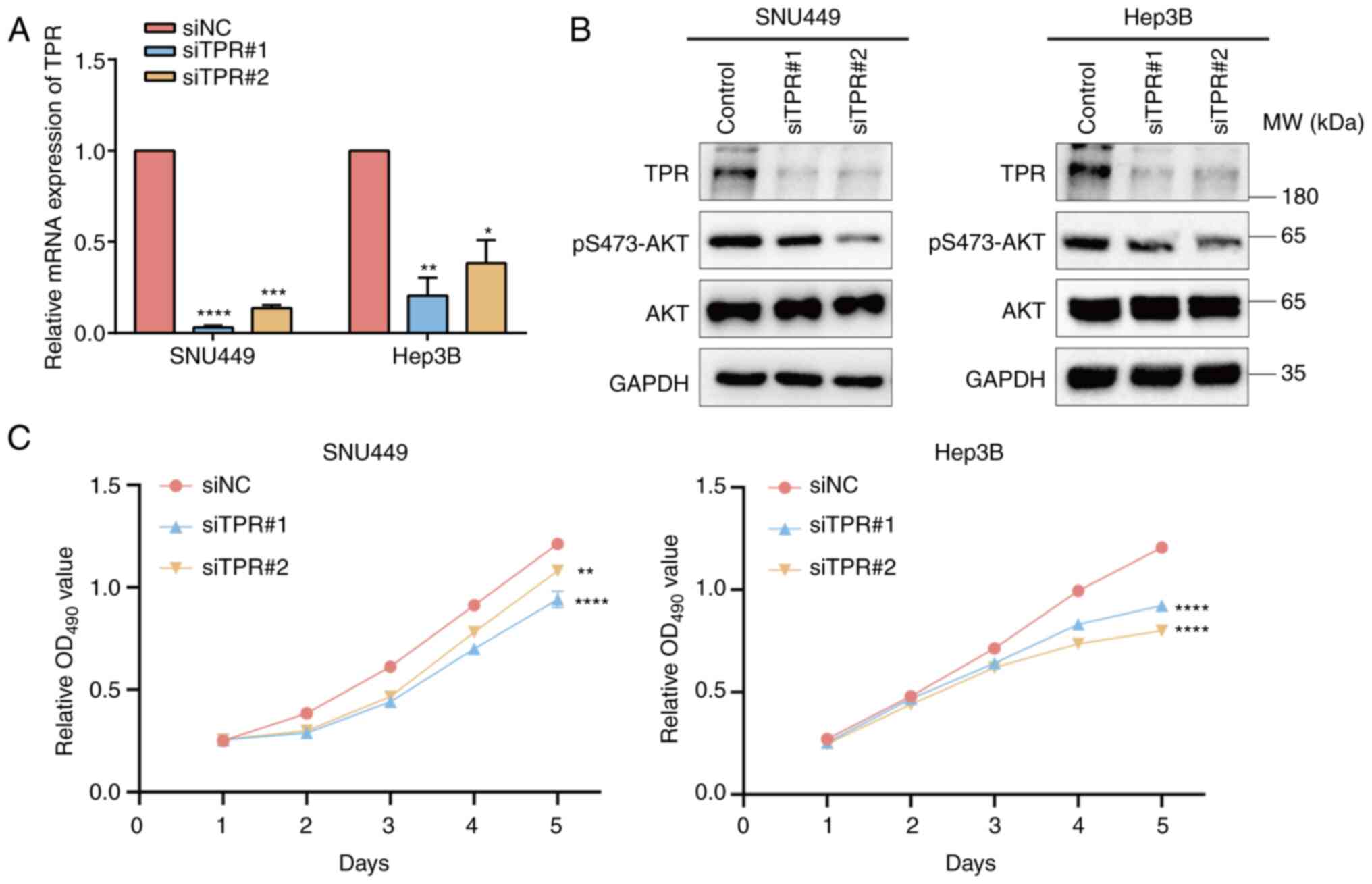|
1
|
Bray F, Ferlay J, Soerjomataram I, Siegel
RL, Torre LA and Jemal A: Global cancer statistics 2018: GLOBOCAN
estimates of incidence and mortality worldwide for 36 cancers in
185 countries. CA Cancer J Clin. 68:394–424. 2018.PubMed/NCBI View Article : Google Scholar
|
|
2
|
Sung H, Ferlay J, Siegel RL, Laversanne M,
Soerjomataram I, Jemal A and Bray F: Global cancer statistics 2020:
GLOBOCAN estimates of incidence and mortality worldwide for 36
cancers in 185 countries. CA Cancer J Clin. 71:209–49.
2021.PubMed/NCBI View Article : Google Scholar
|
|
3
|
European Association for the Study of the
Liver. Electronic address: easloffice@easloffice.eu; European
Association for the Study of the Liver. EASL clinical practice
guidelines: Management of hepatocellular carcinoma. J Hepatol.
69:182–236. 2018.PubMed/NCBI View Article : Google Scholar
|
|
4
|
Kulik L and El-Serag HB: Epidemiology and
management of hepatocellular carcinoma. Gastroenterology.
156:477–491.e1. 2019.PubMed/NCBI View Article : Google Scholar
|
|
5
|
Chaiteerakij R, Addissie BD and Roberts
LR: Update on biomarkers of hepatocellular carcinoma. Clin
Gastroenterol Hepatol. 13:237–245. 2015.PubMed/NCBI View Article : Google Scholar
|
|
6
|
Byrd DA, Sweet DJ, Pante N, Konstantinov
KN, Guan T, Saphire AC, Mitchell PJ, Cooper CS, Aebi U and Gerace
L: Tpr, a large coiled coil protein whose amino terminus is
involved in activation of oncogenic kinases, is localized to the
cytoplasmic surface of the nuclear pore complex. J Cell Biol.
127:1515–1526. 1994.PubMed/NCBI View Article : Google Scholar
|
|
7
|
Cordes VC, Reidenbach S, Rackwitz HR and
Franke WW: Identification of protein p270/Tpr as a constitutive
component of the nuclear pore complex-attached intranuclear
filaments. J Cell Biol. 136:515–529. 1997.PubMed/NCBI View Article : Google Scholar
|
|
8
|
Bangs P, Burke B, Powers C, Craig R,
Purohit A and Doxsey S: Functional analysis of Tpr: Identification
of nuclear pore complex association and nuclear localization
domains and a role in mRNA export. J Cell Biol. 143:1801–1812.
1998.PubMed/NCBI View Article : Google Scholar
|
|
9
|
Cordes VC, Hase ME and Muller L: Molecular
segments of protein Tpr that confer nuclear targeting and
association with the nuclear pore complex. Exp Cell Res. 245:43–56.
1998.PubMed/NCBI View Article : Google Scholar
|
|
10
|
Hase ME, Kuznetsov NV and Cordes VC: Amino
acid substitutions of coiled-coil protein Tpr abrogate anchorage to
the nuclear pore complex but not parallel, in-register
homodimerization. Mol Biol Cell. 12:2433–2452. 2001.PubMed/NCBI View Article : Google Scholar
|
|
11
|
Frosst P, Guan T, Subauste C, Hahn K and
Gerace L: Tpr is localized within the nuclear basket of the pore
complex and has a role in nuclear protein export. J Cell Biol.
156:617–630. 2002.PubMed/NCBI View Article : Google Scholar
|
|
12
|
Fontoura BM, Dales S, Blobel G and Zhong
H: The nucleoporin Nup98 associates with the intranuclear
filamentous protein network of TPR. Proc Natl Acad Sci USA.
98:3208–3213. 2001.PubMed/NCBI View Article : Google Scholar
|
|
13
|
Agarwal S, Yadav SK and Dixit A:
Heterologous expression of translocated promoter region protein,
Tpr, identified as a transcription factor from Rattus norvegicus.
Protein Expr Purif. 77:112–117. 2011.PubMed/NCBI View Article : Google Scholar
|
|
14
|
Krull S, Dörries J, Boysen B, Reidenbach
S, Magnius L, Norder H, Thyberg J and Cordes VC: Protein Tpr is
required for establishing nuclear pore-associated zones of
heterochromatin exclusion. EMBO J. 29:1659–1673. 2010.PubMed/NCBI View Article : Google Scholar
|
|
15
|
Aksenova V, Smith A, Lee H, Bhat P,
Esnault C, Chen S, Iben J, Kaufhold R, Yau KC, Echeverria C, et al:
Nucleoporin TPR is an integral component of the TREX-2 mRNA export
pathway. Nat Commun. 11(4577)2020.PubMed/NCBI View Article : Google Scholar
|
|
16
|
Lee ES, Wolf EJ, Ihn SSJ, Smith HW, Emili
A and Palazzo AF: TPR is required for the efficient nuclear export
of mRNAs and lncRNAs from short and intron-poor genes. Nucleic
Acids Res. 48:11645–11663. 2020.PubMed/NCBI View Article : Google Scholar
|
|
17
|
Vomastek T, Iwanicki MP, Burack WR, Tiwari
D, Kumar D, Parsons JT, Weber MJ and Nandicoori VK: Extracellular
signal-regulated kinase 2 (ERK2) phosphorylation sites and docking
domain on the nuclear pore complex protein Tpr cooperatively
regulate ERK2-Tpr interaction. Mol Cell Biol. 28:6954–6966.
2008.PubMed/NCBI View Article : Google Scholar
|
|
18
|
Su Y, Pelz C, Huang T, Torkenczy K, Wang
X, Cherry A, Daniel CJ, Liang J, Nan X, Dai MS, et al:
Post-translational modification localizes MYC to the nuclear pore
basket to regulate a subset of target genes involved in cellular
responses to environmental signals. Genes Dev. 32:1398–1419.
2018.PubMed/NCBI View Article : Google Scholar
|
|
19
|
Wei S, Hu M, Yang Y, Huang X, Li B, Ding L
and Wang P: Case report: Short-term response to first-line
crizotinib monotherapy in a metastatic lung adenocarcinoma patient
harboring a novel TPR-ROS1 fusion. Front Oncol.
12(862008)2022.PubMed/NCBI View Article : Google Scholar
|
|
20
|
Choi YL, Lira ME, Hong M, Kim RN, Choi SJ,
Song JY, Pandy K, Mann DL, Stahl JA, Peckham HE, et al: A novel
fusion of TPR and ALK in lung adenocarcinoma. J Thorac Oncol.
9:563–566. 2014.PubMed/NCBI View Article : Google Scholar
|
|
21
|
Dewi FRP, Jiapaer S, Kobayashi A, Hazawa
M, Ikliptikawati DK, Hartono Sabit H, Nakada M and Wong RW:
Nucleoporin TPR (translocated promoter region, nuclear basket
protein) upregulation alters MTOR-HSF1 trails and suppresses
autophagy induction in ependymoma. Autophagy. 17:1001–1012.
2021.PubMed/NCBI View Article : Google Scholar
|
|
22
|
Deland L, Keane S, Bontell TO, Fagman H,
Sjögren H, Lind AE, Carén H, Tisell M, Nilsson JA, Ejeskär K, et
al: Novel TPR::ROS1 fusion gene activates MAPK, PI3K and JAK/STAT
signaling in an infant-type pediatric glioma. Cancer Genomics
Proteomics. 19:711–726. 2022.PubMed/NCBI View Article : Google Scholar
|
|
23
|
Moon SW, Mo HY, Choi EJ, Yoo NJ and Lee
SH: Cancer-related SRCAP and TPR mutations in colon cancers. Pathol
Res Pract. 217(153292)2021.PubMed/NCBI View Article : Google Scholar
|
|
24
|
Lim HY, Sohn I, Deng S, Lee J, Jung SH,
Mao M, Xu J, Wang K, Shi S, Joh JW, et al: Prediction of
disease-free survival in hepatocellular carcinoma by gene
expression profiling. Ann Surg Oncol. 20:3747–3753. 2013.PubMed/NCBI View Article : Google Scholar
|
|
25
|
Kim JH, Sohn BH, Lee HS, Kim SB, Yoo JE,
Park YY, Jeong W, Lee SS, Park ES, Kaseb A, et al: Genomic
predictors for recurrence patterns of hepatocellular carcinoma:
Model derivation and validation. PLoS Med.
11(e1001770)2014.PubMed/NCBI View Article : Google Scholar
|
|
26
|
Wang YH, Cheng TY, Chen TY, Chang KM,
Chuang VP and Kao KJ: Plasmalemmal vesicle associated protein
(PLVAP) as a therapeutic target for treatment of hepatocellular
carcinoma. BMC Cancer. 14(815)2014.PubMed/NCBI View Article : Google Scholar
|
|
27
|
Knapek KJ, Georges HM, Van Campen H,
Bishop JV, Bielefeldt-Ohmann H, Smirnova NP and Hansen TR: Fetal
lymphoid organ immune responses to transient and persistent
infection with bovine viral diarrhea virus. Viruses.
12(816)2020.PubMed/NCBI View Article : Google Scholar
|
|
28
|
Wang S, Yao X, Ma S, Ping Y, Fan Y, Sun S,
He Z, Shi Y, Sun L, Xiao S, et al: A single-cell transcriptomic
landscape of the lungs of patients with COVID-19. Nat Cell Biol.
23:1314–1328. 2021.PubMed/NCBI View Article : Google Scholar
|
|
29
|
Zhu Y, Chen M, Xu D, Li TE, Zhang Z, Li
JH, Wang XY, Yang X, Lu L, Jia HL, et al: The combination of PD-1
blockade with interferon-α has a synergistic effect on
hepatocellular carcinoma. Cell Mol Immunol. 19:726–737.
2022.PubMed/NCBI View Article : Google Scholar
|
|
30
|
Han H, Lin T, Wang Z, Song J, Fang Z,
Zhang J, You X, Du Y, Ye J and Zhou G: RNA-binding motif 4 promotes
angiogenesis in HCC by selectively activating VEGF-A expression.
Pharmacol Res. 187(106593)2022.PubMed/NCBI View Article : Google Scholar
|
|
31
|
Yi C, Chen L, Lin Z, Liu L, Shao W, Zhang
R, Lin J, Zhang J, Zhu W, Jia H, et al: Lenvatinib targets FGF
receptor 4 to enhance antitumor immune response of anti-programmed
cell death-1 in HCC. Hepatology. 74:2544–2560. 2021.PubMed/NCBI View Article : Google Scholar
|
|
32
|
Xiao Z, Wang Y and Ding H: XPD suppresses
cell proliferation and migration via miR-29a-3p-Mdm2/PDGF-B axis in
HCC. Cell Biosci. 9(6)2019.PubMed/NCBI View Article : Google Scholar
|
|
33
|
Kalathil SG, Wang K, Hutson A, Iyer R and
Thanavala Y: Tivozanib mediated inhibition of c-Kit/SCF signaling
on Tregs and MDSCs and reversal of tumor induced immune suppression
correlates with survival of HCC patients. Oncoimmunology.
9(1824863)2020.PubMed/NCBI View Article : Google Scholar
|
|
34
|
Li DK, Chen XR, Wang LN, Wang JH, Li JK,
Zhou ZY, Li X, Cai LB, Zhong SS, Zhang JJ, et al: Exosomal HMGA2
protein from EBV-positive NPC cells destroys vascular endothelial
barriers and induces endothelial-to-mesenchymal transition to
promote metastasis. Cancer Gene Ther. 29:1439–1451. 2022.PubMed/NCBI View Article : Google Scholar
|
|
35
|
Li Z, Wu X, Li J, Yu S, Ke X, Yan T, Zhu
Y, Cheng J and Yang J: HMGA2-Snai2 axis regulates tumorigenicity
and stemness of head and neck squamous cell carcinoma. Exp Cell
Res. 418(113271)2022.PubMed/NCBI View Article : Google Scholar
|
|
36
|
Huang FY, Wong DK, Mak LY, Cheung TT, Seto
WK and Yuen MF: Hepatitis B virus X protein promotes
hepatocarcinogenesis via the activation of HMGA2/STC2 signaling to
counteract oxidative stress-induced cell death. Carcinogenesis.
43:671–681. 2022.PubMed/NCBI View Article : Google Scholar
|
|
37
|
Che F, Han Y, Fu J, Wang N, Jia Y, Wang K
and Ge J: LncRNA MALAT1 induced by hyperglycemia promotes
microvascular endothelial cell apoptosis through activation of the
miR-7641/TPR axis to exacerbate neurologic damage caused by
cerebral small vessel disease. Ann Transl Med.
9(1762)2021.PubMed/NCBI View Article : Google Scholar
|
|
38
|
Yuan S, Norgard RJ and Stanger BZ:
Cellular plasticity in cancer. Cancer Discov. 9:837–851.
2019.PubMed/NCBI View Article : Google Scholar
|
|
39
|
Yan K, Wang Y, Lu Y and Yan Z: Coexpressed
genes that promote the infiltration of M2 macrophages in melanoma
can evaluate the prognosis and immunotherapy outcome. J Immunol
Res. 2021(6664791)2021.PubMed/NCBI View Article : Google Scholar
|
|
40
|
Pratt HG, Steinberger KJ, Mihalik NE, Ott
S, Whalley T, Szomolay B, Boone BA and Eubank TD: Macrophage and
neutrophil interactions in the pancreatic tumor microenvironment
drive the pathogenesis of pancreatic cancer. Cancers (Basel).
14(194)2021.PubMed/NCBI View Article : Google Scholar
|
|
41
|
Zhang H, Luo YB, Wu W, Zhang L, Wang Z,
Dai Z, Feng S, Cao H, Cheng Q and Liu Z: The molecular feature of
macrophages in tumor immune microenvironment of glioma patients.
Comput Struct Biotechnol J. 19:4603–4618. 2021.PubMed/NCBI View Article : Google Scholar
|
|
42
|
Pardoll DM: The blockade of immune
checkpoints in cancer immunotherapy. Nat Rev Cancer. 12:252–264.
2012.PubMed/NCBI View Article : Google Scholar
|
|
43
|
Jenkins L, Jungwirth U, Avgustinova A,
Iravani M, Mills A, Haider S, Harper J and Isacke CM:
Cancer-associated fibroblasts suppress CD8+ T-cell infiltration and
confer resistance to immune-checkpoint blockade. Cancer Res.
82:2904–2917. 2022.PubMed/NCBI View Article : Google Scholar
|
|
44
|
Asdourian MS, Shah N, Jacoby TV, Semenov
YR, Otto T, Thompson LL, Dee EC, Reynolds KL and Chen ST:
Development of multiple cutaneous immune-related adverse events
among cancer patients after immune checkpoint blockade. J Am Acad
Dermatol. 88:485–487. 2023.PubMed/NCBI View Article : Google Scholar
|
|
45
|
Hua H, Zhang H, Chen J, Wang J, Liu J and
Jiang Y: Targeting Akt in cancer for precision therapy. J Hematol
Oncol. 14(128)2021.PubMed/NCBI View Article : Google Scholar
|
|
46
|
Paskeh MDA, Ghadyani F, Hashemi M,
Abbaspour A, Zabolian A, Javanshir S, Razzazan M, Mirzaei S,
Entezari M, Goharrizi MASB, et al: Biological impact and
therapeutic perspective of targeting PI3K/Akt signaling in
hepatocellular carcinoma: Promises and challenges. Pharmacol Res.
187(106553)2023.PubMed/NCBI View Article : Google Scholar
|
|
47
|
Khemlina G, Ikeda S and Kurzrock R: The
biology of Hepatocellular carcinoma: Implications for genomic and
immune therapies. Mol Cancer. 16(149)2017.PubMed/NCBI View Article : Google Scholar
|















